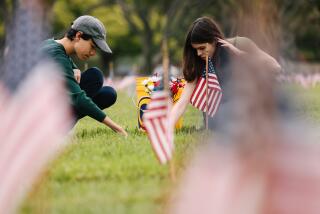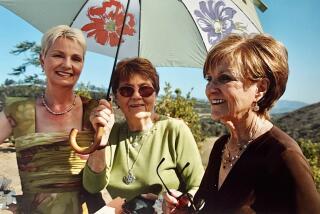Staying true to roots as family branches Ties that bind far-flung family
- Share via
It wasn’t the sort of family reunion we had planned.
I’d spent weeks searching for cheap airfares so I could take my children south for a summer reunion of the Daniel clan, my maternal relatives.
Instead, I flew alone on a bereavement fare to Alabama last week and helped bury Aunt Ora, the matriarch of our far-flung family.
It’s a ritual familiar to middle-aged California transplants like me. Relatives back home age and drop off the family tree like autumn leaves, forcing funeral trips that upend our plans, max out credit cards and reshuffle roles and responsibilities.
And teach us that family bonds can be stretched, but not broken by geography.
There was a lot to get used to when I moved from Cleveland to Los Angeles at 23. Sipping margaritas poolside on Christmas Eve. Neighbors who spoke Spanish, Afrikaans, Hebrew or Farsi. The notion of flip-flops as formal footwear for a fancy wedding on the beach.
I noticed the pride native Californians took in their families’ local longevity. “I’m fifth generation,” new acquaintances would proclaim, as if to distinguish themselves from new emigres, who hadn’t known what we were missing until we saw the Rose Parade on TV.
By contrast, my family’s pride centered not on being rooted in one place, but on our journey up, out and away from our center, into new lives of comfort and prosperity.
My mother’s family grew up on a farm in Alabama in an era when graduating from high school was a reach. One by one, she and her siblings headed north to find work in the 1940s; most of them landed in Ohio.
In half a century in Cleveland, my mother, her brother and three sisters never lived more than a few miles from one another. In hard times, our families doubled up. Cousins grew up more like sisters and brothers; a week didn’t pass without us seeing one another.
Every summer, we vacationed together on the family farm, which had no electric power or running water. We bathed in big silver tubs, washed our clothes in the stream, held our noses in the outhouse. And never realized how much we’d miss feeding chickens and slopping hogs until our grandparents died and the visits stopped.
My cousins and I were an upwardly mobile bunch. College scholarships, military careers and professional choices scattered us -- to California; Indiana; Washington, D.C.; Nevada; New York; Oregon. Meanwhile, our elders returned to Alabama.
We stayed in touch, sent pictures of our kids and gathered when we could for holidays, birthdays and weddings . . . and now a steady stream of funerals.
Our mourning and celebrations had the same hallmarks. We bickered and joked, shared childhood stories and tried not to notice our own aging process.
But there was no escaping the truth this time -- and not just because of the balding heads and funeral programs held for better focus at arm’s length.
It was hard to see Aunt Ora’s young grandson sobbing through his first familial loss. But it was harder for us to watch Aunt Rose and Aunt Lottie -- the only two sisters left -- sitting red-eyed in their church pew, clinging to each other.
And imagining ourselves in their spots.
We held a family meeting that night after the funeral ended, to talk about the family farm, Aunt Rose’s deteriorating health and our financial commitments to one another.
We wound up -- as we always do -- caught up in childhood roles, alternately arguing, bossing and supporting one another. The unspoken subtext was loud and clear: Who are we to be deciding such things?
But each death moves us closer to the family’s top rung, when it will be our job to sustain the legacy of an ever-expanding brood scattered across the country.
Aunt Ora left us a road map to follow. Never mind that her back ached, her legs swelled and she was always in debt. She made it to her grandson’s wedding in Antigua, her nephew’s birthday party in California, her great-granddaughter’s birth in Ohio.
It’s our turn now to do the traveling.
--


